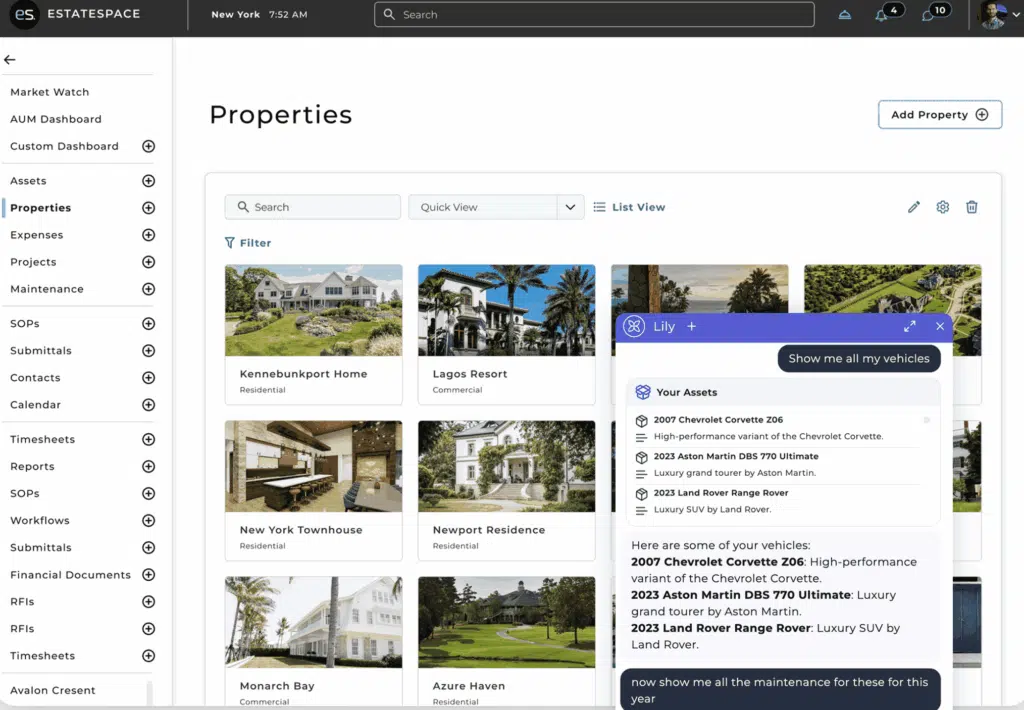You’ve mastered the art of managing smaller households, but now you’re eyeing those prestigious luxury estates. However, making the leap to become a full-scale estate manager isn’t just about managing more—it’s about orchestrating an entirely different level of complexity and sophistication.
The reality? Unfortunately, many professionals find themselves overwhelmed when they first step into managing multi-million-dollar properties with extensive grounds, multiple staff members, and owners who expect nothing short of perfection. Nevertheless, with the right approach, this transition can be your pathway to a truly rewarding career in luxury estate management.

The Modern Estate Manager Challenge
Furthermore, estate managers today face unprecedented complexity. Additionally, gone are the days when a simple notebook and phone calls could handle everything. Instead, today’s luxury estates demand:
- Multiple property coordination across different time zones
- Complex vendor management with dozens of specialized service providers
- Staff oversight for teams ranging from housekeepers to groundskeepers to security personnel
- Project management for renovations that can span months or years
- Financial oversight of budgets often exceeding hundreds of thousands annually
Unfortunately, traditional methods—juggling emails, text messages, and countless spreadsheets—simply can’t keep pace. Moreover, estate managers are responsible for managing staff, overseeing maintenance and repairs, scheduling events, and ensuring that the property runs smoothly. Consequently, when you’re dealing with multiple properties and extensive teams, these outdated systems become a recipe for costly mistakes and burnout.
Essential Skills for Estate Manager Success
Financial Mastery Beyond Basic Budgeting First and foremost, managing a luxury estate means handling substantial financial responsibilities. Therefore, you’ll need expertise in vendor negotiations, contract management, and complex expense tracking across multiple properties and departments.
Technology Integration and AI Adoption Meanwhile, AI is transforming how estate managers operate. Specifically, from predictive maintenance scheduling to automated vendor communications, embracing AI-powered solutions helps you stay ahead of issues before they become problems. As a result, modern estate managers who leverage these technologies can manage larger, more complex properties with greater efficiency.
Leadership and Human Resources Furthermore, your role extends far beyond task management. In fact, you’re building and leading teams, creating positive work environments, and ensuring everyone from the head chef to the groundskeeping crew works in harmony toward shared goals.
Building Your Professional Network
Importantly, success as an estate manager relies heavily on relationships. Therefore, cultivate connections with:
- Specialized contractors who understand luxury standards
- High-end service providers in areas like security, landscaping, and technology
- Other estate managers who can share insights and recommendations
- Family offices and asset managers who understand the unique needs of high-net-worth families
For comprehensive insights into the broader estate management landscape, explore our guide on Understanding Estate Management: Beyond Household Operations.

The Technology Revolution in Estate Management
Clearly, the most successful estate managers today aren’t just organized—they’re digitally empowered. Furthermore, AI-driven platforms now handle routine communications, track maintenance schedules automatically, and provide real-time insights into property operations.
Notably, EstateSpace represents this new generation of purpose-built, AI-powered estate management platforms. Rather than fighting with disconnected spreadsheets and endless email chains, modern tools centralize everything from vendor contacts to maintenance histories, creating the seamless operation that luxury property owners expect.
Whether you’re working with family offices, coordinating with asset managers, or serving as a project manager for major renovations, having the right technology foundation makes all the difference.
Making the Transition Successfully
Start with Assessment Initially, before taking on larger estates, honestly evaluate your current capabilities. Obviously, what worked for a 5,000 square foot home won’t necessarily scale to a 50,000 square foot estate with guest houses, staff quarters, and extensive grounds.
Invest in Continuous Learning Similarly, the luxury estate management field evolves constantly. As the hospitality industry embraces AI and personalization trends, estate managers must also stay current with industry developments, attend professional development programs, and seek mentorship from experienced estate managers who’ve successfully managed the transition.
Implement Robust Systems Early Crucially, don’t wait until you’re overwhelmed to upgrade your operational systems. Indeed, an estate manager or house manager is a professional who handles the day-to-day operations of a luxury property. Therefore, establish efficient processes for everything from staff scheduling to vendor management before complexity scales beyond your ability to manage manually.
The Path Forward
Ultimately, transitioning to estate manager roles for luxury properties represents both a significant challenge and an incredible opportunity. Additionally, the combination of traditional hospitality skills, modern technology adoption, and sophisticated project management creates a career path that’s both personally fulfilling and financially rewarding.
Moreover, the families and individuals who own these properties aren’t just looking for someone to manage their homes—they’re seeking trusted partners who can enhance their quality of life while protecting their most valuable assets.
Finally, ready to take your estate management career to the next level? Discover how modern, AI-powered solutions can support your transition to managing luxury estates. Learn more about EstateSpace and see how technology can transform your approach to estate management.
Looking to discuss your specific estate management challenges? We’re here to help you navigate this exciting career transition. Contact our team for personalized guidance on advancing your estate management career.



